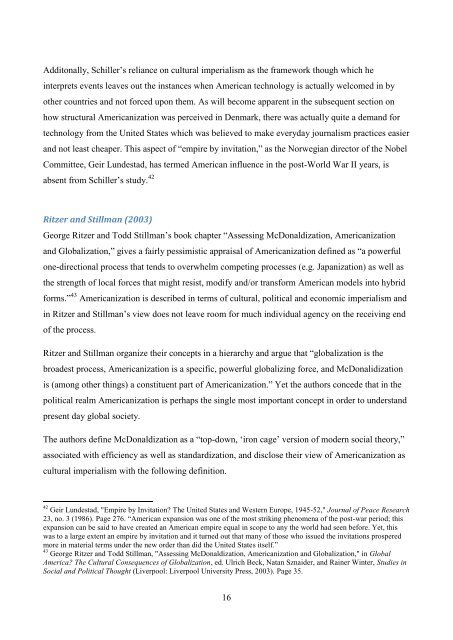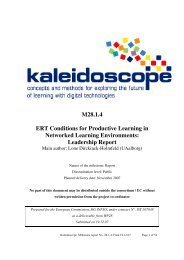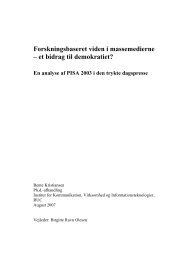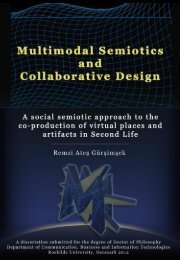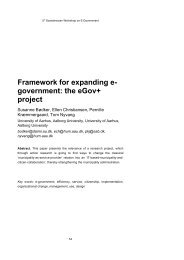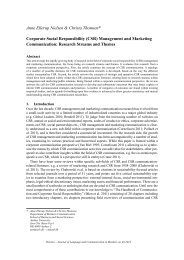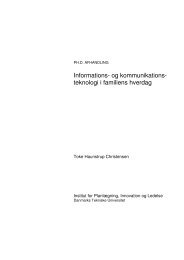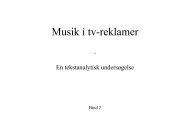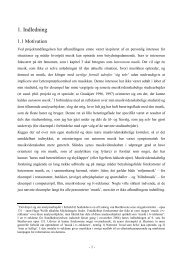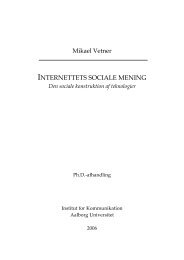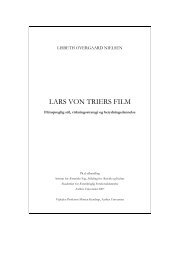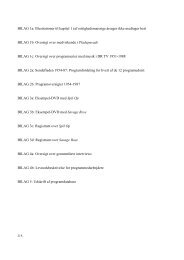The Jeremiad Over Journalism
The Jeremiad Over Journalism
The Jeremiad Over Journalism
You also want an ePaper? Increase the reach of your titles
YUMPU automatically turns print PDFs into web optimized ePapers that Google loves.
Additonally, Schiller‘s reliance on cultural imperialism as the framework though which he<br />
interprets events leaves out the instances when American technology is actually welcomed in by<br />
other countries and not forced upon them. As will become apparent in the subsequent section on<br />
how structural Americanization was perceived in Denmark, there was actually quite a demand for<br />
technology from the United States which was believed to make everyday journalism practices easier<br />
and not least cheaper. This aspect of ―empire by invitation,‖ as the Norwegian director of the Nobel<br />
Committee, Geir Lundestad, has termed American influence in the post-World War II years, is<br />
absent from Schiller‘s study. 42<br />
Ritzer and Stillman (2003)<br />
George Ritzer and Todd Stillman‘s book chapter ―Assessing McDonaldization, Americanization<br />
and Globalization,‖ gives a fairly pessimistic appraisal of Americanization defined as ―a powerful<br />
one-directional process that tends to overwhelm competing processes (e.g. Japanization) as well as<br />
the strength of local forces that might resist, modify and/or transform American models into hybrid<br />
forms.‖ 43 Americanization is described in terms of cultural, political and economic imperialism and<br />
in Ritzer and Stillman‘s view does not leave room for much individual agency on the receiving end<br />
of the process.<br />
Ritzer and Stillman organize their concepts in a hierarchy and argue that ―globalization is the<br />
broadest process, Americanization is a specific, powerful globalizing force, and McDonalidization<br />
is (among other things) a constituent part of Americanization.‖ Yet the authors concede that in the<br />
political realm Americanization is perhaps the single most important concept in order to understand<br />
present day global society.<br />
<strong>The</strong> authors define McDonaldization as a ―top-down, ‗iron cage‘ version of modern social theory,‖<br />
associated with efficiency as well as standardization, and disclose their view of Americanization as<br />
cultural imperialism with the following definition.<br />
42 Geir Lundestad, "Empire by Invitation? <strong>The</strong> United States and Western Europe, 1945-52," Journal of Peace Research<br />
23, no. 3 (1986). Page 276. ―American expansion was one of the most striking phenomena of the post-war period; this<br />
expansion can be said to have created an American empire equal in scope to any the world had seen before. Yet, this<br />
was to a large extent an empire by invitation and it turned out that many of those who issued the invitations prospered<br />
more in material terms under the new order than did the United States itself.‖<br />
43 George Ritzer and Todd Stillman, "Assessing McDonaldization, Americanization and Globalization," in Global<br />
America? <strong>The</strong> Cultural Consequences of Globalization, ed. Ulrich Beck, Natan Sznaider, and Rainer Winter, Studies in<br />
Social and Political Thought (Liverpool: Liverpool University Press, 2003). Page 35.<br />
16


